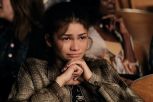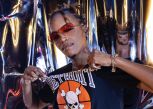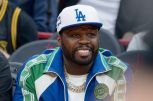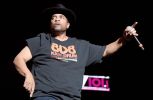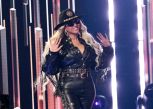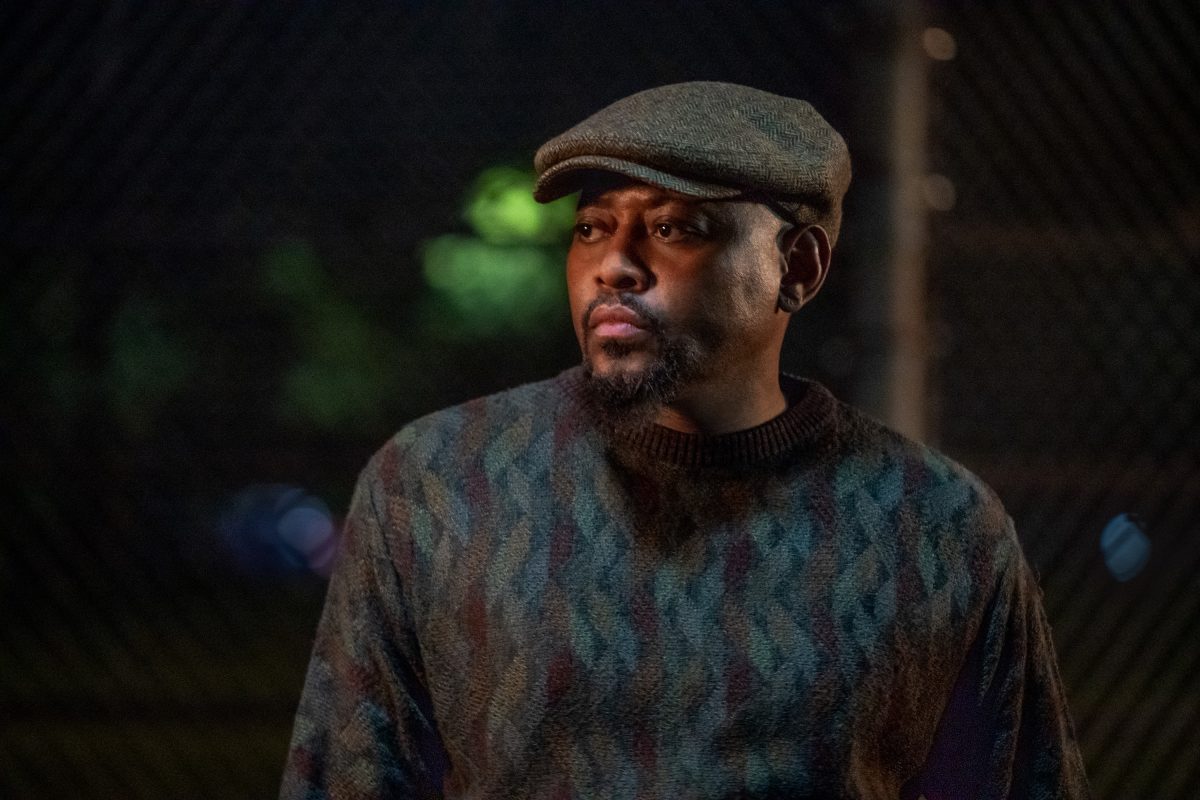
Source: Courtesy STARZ / Starz
When you think of iconic Black actors, Omar Epps is sure to cross your mind. He’s solidified his legacy as one of our generation’s most prominent actors across many genres starring in films like Juice, Love & Basketball, Scream 2, The Wood, and more recently on the small screen with House and Power Book III: Raising Kanan. But aside from playing Detective Malcolm Howard, the New York City native has entered a new arena entirely.
A serendipitous lightblub moment at BookCon in 2019 inspired Omar Epps to return to one of his first loves, writing. After fleshing out a career as a successful actor and producer, he felt it was only right to delve into his other artistic passions.
“For me, there was no transition. I think the better word is evolution.” Epps told MADAMENOIRE. “It’s the evolution of a career. Because I’m gonna direct films, I’ve been writing films. I’m gonna produce. Now in the literary world. The things that I envision have no label.”
Nubia: The Awakening is a story with a familiar sci-fi trope of dystopian futures but is done in a revolutionary way that brings diversity, camaraderie and familiarity to the forefront. Epps says the story’s premise came from a simple thought he toyed with while thinking about the tumultuous world we live in.
“What if… What would the world look like if love itself was illegal? Like actually illegal, and then reborn through this 13-year-old kid who is love itself?”
The book’s synopsis reads as follows
For Zuberi, Uzochi and Lencho, Nubia is a mystery. Before they were born, a massive storm destroyed their ancestral homeland, forcing their families to flee across the ocean to NYC. Nubia, a utopic island nation off the coast of West Africa, was no more, and their parents’ sorrow was too deep for them to share much of their history beyond the folklore.
But New York, ravaged by climate change and class division, is far from a safe haven for refugees and Nubians live as outcasts, struggling to survive in the constantly flooding lower half of Manhattan, while the rich thrive in the tech-driven sky city known as the Up High.
To many, being Nubian means you’re fated for a life plagued by difficulties and disrespect. But Zuberi, Uzochi and Lencho are beginning to feel there might be more. Something within them is changing, giving each of them extraordinary powers. Extraordinary and terrifying powers that seem to be tied to the secrets their parents have kept from them.
Epps’ passion and love for the story comes through every sentence he speaks when asked about his latest project.
“At the core of the book, it’s about unity through the human experience,” he mentioned when asked about his inspiration for Nubia.
To learn more about Nubia, continue below for our interview, where Epps delves into his journey from actor to author, how his experiences inspire the story, and his plans for the future.
Nubia: The Awakening was published on Nov. 8. and can be ordered directly from Underlined. MN sat down with Omar Epps to talk further about his book writing journey
MADAMENOIRE: You’ve been acting for a long time. Have you wanted to write, or was it a newer thing that came to you?
Omar Epps: Well, to be honest with you, my career as an actor spawned from me writing when I was a kid, around nine years old. I used to write poetry and write stories. I was always writing. And so, from my journey, acting became an extension of writing. I learned a different form of expression through acting, and it went really good. So, you know, writing takes time and discipline. And I’ve been working so much, but with Nubia… I had the concept in my head for over a decade. And it was just, you know, that light bulb moment for me. I wrote a memoir called From Fatherless to Fatherhood, which talks about my growing up without a father and becoming a father.
And when I was doing stuff like this [Comic-Con], there was a big BookCon in New York. I saw all these kids go crazy like The Beatles were somewhere. All these kids just ran over there. Because I was just skeptical and curious, like, ‘do kids still read like I read when I was a kid?’ It was hundreds and hundreds of kids. And I was like, ‘who are they going up to’? But someone said, ”oh, they write young adult sci-fi.” And that was a lightbulb moment because I had been sitting with this idea. And suddenly, it felt like it was time to activate now. Right? I didn’t even know that this had such a strong following. It took three and a half years to write the book with my co-writer, Clarence Haynes, and here we are. I’m excited.
MN: You said you started out writing, was this story inspired by any of your past work, like any movies or anything, or is it inspired by life–
OE: It’s inspired by life. Nubia was truly inspired by a very, very simple thought. We live in a tumultuous world. Right now, we probably think the world is going to shit – it’s over. If you ask the generation from World War I, they’d be like, ‘No, we thought it was over.’ I just had this idea one day. ‘What if… What would the world look like if love itself was illegal? Like actually illegal, and then reborn through this 13-year-old kid who is love itself?’ That was the nugget of the idea for me. And it’s just like, it’s almost in our world now. It almost kind of seems that way. They put, you know, white against black. They put tall against short. You know, Christian against Muslim and everything like that. At the core of the book, it’s about unity through the human experience.
Then I just started building the mythology and mapping it out. I came to a point where I was like, ‘what if there was a utopian society, at one point in our existence, where everything was perfect? What if, whatever our interpretation of what heaven is, actually existed where human beings are in total balance with not only each other but the land, every animal, and everything, and the gift then is that they all have a superpower or gift?’ Each individual has a different thing that brings balance to the community. Then I just, you know, went into my creative nether world and built this book, so I’m really excited. There are a lot of themes that I think the young readers, and all readers, but specifically young readers, will connect to because they’re all of these euphemisms that feel like right now, but the book takes place 100 years from now. You know what I mean? So I tried to be as meticulous as possible in getting all of those buckets filled for the reader so that they truly go on a journey.
MN: The book obviously has science fiction and this dystopian future. Still, it also has themes and things like climate change and racial tension that are both classic and very timely. How do you balance all that out so that it’s still a fun adventure while touching on these important topics you want to fit in too?
OE: Yeah, that’s a great question. The thing is, I just lean into what I feel is the truth. And that’s why the book takes place in what I call New New York, right? Because it’s 100 years from now. And that meant something to me because I was born and raised in New York, and it’s also like a microcosm of America, right? Or, the idealistic version of that. ‘Oh, we can all come together and worship differently, and this, that, and the other, but we all eat at the same table.’ And we know the world is not particularly that way.
But growing up, I lived next to a synagogue or a mosque. We walk past the Buddhist and Hindu centers. People here are from all persuasions of life, and now we’re all on the train; I’m going to school, they’re going to work. You learn about different cultures, different foods… there were the boricuas and the Dominicans uptown. I wanted to pour all of my experiences of growing up into this book because the more we change, the more we stay the same.
That’s why it was important to me for this to be a coming-of-age story. Because when we’re 13, 14, or 15, our mind is a sponge. And you think you know it all, but at the same time, you don’t because somebody else is paying the rent, and you got to live under their rules. You’re balancing that with this innate feeling only you can feel because you are you. You put that with you and you; now we’re the Motley Crew going to school together, growing up on the block but having different familial experiences and things.
I wanted to put all of that in the story. So to your question, it’s like the isms, right? Whether it’s racism, classism, or sexism, I wanted to grab what we are experiencing in the now and unpack them in my own unique way. I thought it was important to put that in the future so it would disarm people. I’m a visionary because I’ve always thought, ‘what’s it gonna look like tomorrow?’ I don’t have an answer to the why of that, but that’s just how I’m wired. I’m in the now. I’m aware of the now, but I’m always thinking ahead. Things turn over so fast.
MN: What’s it been like going from being known as this iconic actor, representing different sides of black culture, to now writing a book? You mentioned you were a writer first, so what’s it been like getting back to writing?
OE: It’s been an interesting journey. I relish the challenges of life. I say that to say it’s all in a pot. It’s gumbo. I don’t separate the parts, whether music, dance, sculpting, painting, or acting. It’s all art to me. So there was no transition in that way; the transition is in the feeling of vulnerability. I started my career so young; I was 17 years old. So the beauty of being so young is it shielded me from the reality of how hard it is to do anything in this business.
I was like, ‘Oh, this is what it is. I dreamt this yesterday, and now I’m doing it.’ And I didn’t know that’s not how it is. So at this point, you know, coming up on 50 years old and venturing into a new field. I like it. I’m doing the same formula. With every script I’ve ever read, I’m the audience. I’m not me. When I read a script, I’m watching the movie. Because I’m like, ‘Oh, I’d go see this.’ This has nothing to do with the character they want me for; it’s ‘how am I going to experience this?’ For every movie someone’s seen me in, there are hundreds of movies that I was like, ‘Nah,’ because I wouldn’t want to go see that.
But with this, there’s a whole different medium. Not to be so New York, but it’s like Broadway. Like, that’s the thing about Broadway that people don’t realize, like, the audience is snobby. We are not impressed that you did X, Y, and Z; this is our shit. The literary world is like that. So I feel kind of comfortable because, not for nothing, people know that I walk in truth, or at least my truth, and they know that I give 1000% in the way I present my art.
So for me, there was no transition. I think the better word is evolution. It’s the evolution of a career. Because I’m gonna direct films, I’ve been writing films. I’m gonna produce. Now in the literary world. The things that I envision have no label. Nubia is just a particular thing that had to be delivered this way because this is how you get this out. You know what I mean? It’s how I get this out of my head so I can start banging it against the wall every night. Does that make sense?
MN: Yeah that definitely makes sense. Because I’ll have ideas of things I know I want to do, and if I don’t get it done, or at least write it out, it’s just gonna keep pulsing in my mind.
OE: We only got this one shot at this thing we know as life, and I want to fulfill my potential. I’ve always told my family that when it’s time for me to take my last breath in this physical form, I want to feel exhausted. I don’t want to think, ‘oh, I should have. I could have.’ No. I don’t have time for that. That’s why I move so militantly. I gotta get it done because this is the only shot. [If I gotta] smell the roses…you know what, let me plant a rose garden right here while I’m doing this. We got to get it done.
Nubia is not about me. It’s about the generations to come. I’m trying to plant seeds. Every reader will take a different thing and hopefully be inspired and motivated in different ways. And hopefully, they’ll come back together as a community. You might have someone in middle school read it, then reread it in high school. They met a friend in high school who said, ‘Yeah, that was my joint. This was my character…’ And then they’re like, ‘but here’s what I got from it that helped motivate me or keep me through a tough time,’ or whatever the case may be. I move from that space in life as an artist.
MN: With the book, assuming it sells well, do you have plans for more? Is there more story to be told?
OE: Absolutely. Absolutely, and in different forms. I know what you’re getting at. But that’s, you know, that’s the ultimate plan because it’s available to us, right? Even in art, we’re not monolithic. I wanted to build the garden from the first seed planted into the dirt. One of the hardest things to do is grow a plant. I ain’t talking about what you put in it, but to just put a seed into the ground, water it, and hope the sun hits at the right angle.
I’m doing it au-natural. Like, you know what I mean? You know, I’m giving my heart and soul to the world in that way, and I hope that they can feel it. I hope that the reader can feel it, that they will escape when they read this book. It feels like an escape, you know? And it just takes you on a journey. Essentially, I wrote a book that I wish I’d been able to read when I was a kid.
RELATED CONTENT: 6 Feel-Good Books By Black Authors To Read Right Now



